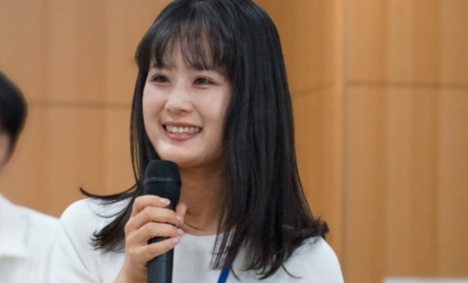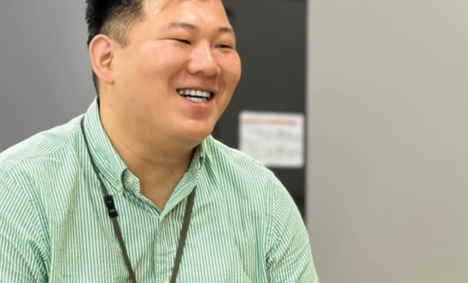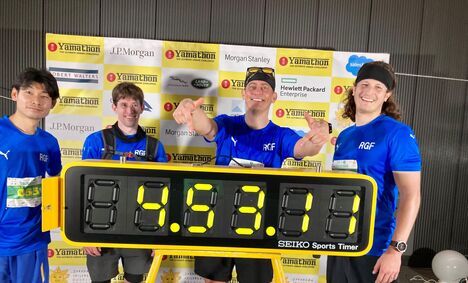Under the vision of ’Better Systems, Better World’, RAKSUL Inc. is revolutionizing the industry by introducing new technologies to fields that have not yet gone digital.
As a milestone for its outstanding growth, on the company’s 10th anniversary, it was listed on the First Section of the Tokyo Stock Exchange.
This time, we had an interview with Mr. Izumi, the company’s CTO, about Raksul Inc. and its engineers.
Raksul has a unique point of view based on a slightly different timeline and history compared to other general tech companies.
- Thank you for your time today. We know that Raksul has been doing business in the fields of printing, logistics, and advertisement. I want to ask you why you’ve chosen those markets.
Raksul, as a company, has two main reasons for choosing our focus industry. One is the scale of the industry and the other is the potential to improve inefficient systems that are not digitized.
We can reduce this inefficiency by introducing technologies to stagnant markets. However, our aim is not to completely remove or revamp an existing system. Our focus is improving the pre-existing structures by identifying and addressing its inefficiencies.
Our CEO, Yasukane Matsumoto, first identified the need to improve the printing industry when he was doing research at A.T. Kearney. Since then, this has been one of our core focuses.
There are only a few large scale companies in the printing industry but there are many other SMEs which could benefit from our services. The logistics industry, which is also one of our focus industries, also has a similar structure where only a few companies dominate the market.
Evidently, there is a similarity between these two cases.
Establishing a successful business isn’t easy. It took us ten years to grow to this level in the printing industry and it took us four years for the logistics industry.
This indicates that we’ve been investing a lot of time in our business. In the future, we anticipate that we are going to establish one new business every 3 - 4 years. In fact, we are currently working on TV commercials.
- So you mean your target is large-scale industries that have not yet been affected by digital technology?
That’s correct. Our target industry’s primary concern is inefficiency that can be improved through the introduction of new technologies into their operations.
- I see. On a different note, congratulations once again for being listed on the First Section of the Tokyo Stock Exchange. How did you celebrate this?
There’s nothing special except for the additional flowers in the office. The product team is focusing on the users and the business team is focusing on the business as always.
So, surprisingly, it was an ordinary day for us. Everyone was so calm that it even made me think we should’ve been a bit more excited. Usually though, everyone gets excited about that. (laughing)
- Indeed, we do have an image of celebrating such a milestone.
I think it is okay to celebrate in that way but no matter what, the focus of our business remains the same despite being listed.
- Has anything changed since the company was listed on the First Section of the Tokyo Stock Exchange?
It might sound a bit obvious, but we’ve gained more reliability and credibility.
Of course, we also need to be more disciplined in terms of our mindset as well as the governance of our company.
- So does it mean the publicity has increased further?
Exactly. We feel it is necessary to always bear a sense of responsibility.

- While companies now are currently driving their business towards a sharing economy model, what do you think has caused Raksul’s growth, including the increase of your stock prices, as well?
As I mentioned, it is because the markets we focus on are large in size and they possess high potential to develop further through digitalization.
With the commercial printing market originally said to be valued at 3 trillion yen, how much would EC advance in the future?
For example, in German, about 50% of the commercial printing sector is EC, while it accounts for only 4 - 5% in Japan. This clearly shows that there is a high possibility to grow the business ten times more.
If half of the market turns to EC and the total profit becomes 1.5 trillion yen, it is quite obvious that amazing things can happen for the business.
70-80% of our stock price’s stability is due in part to these macro-settings. Another factor can also be attributed to the fact that our business aims for services that can eventually be transformed into social infrastructure.
I think that moving forward, we are creating an irreversible business. Let me give you an example to explain what it means.
In the past, to process the printing order, the client first needed to consult with a factory, get an estimation, and negotiate its costs. After that, the client will send the data via USB and the factory needs to modify it, finishing the work 1 - 2 weeks later.
But if this process can be simplified by uploading the files online and by making payments via credit cards, why would you revert back to a more tedious process?
So once companies start investing in digitized processes, consequently our business will expand. For me, I think this is another factor that contributes to stability.
- So this mean that your business model focuses on revolutionizing industries and keeping away from retrogression.
Is it Mr. Matsumoto, CEO of Raksul, who’s mainly in charge of business strategies for Raksul?
Yes. Our CEO thinks long term. On the other side, I’m in charge of implementing the necessary process to turn our CEO’s ideas into reality, which is a more product and service-oriented role.
It should be noted though that the services we currently provide for logistics and printing all began with our CEO’s initiative. Our new venture, TV commercials, was initiated by Tabe, our CMO.

- So Mr. Matsumoto is continuously creating new business ventures while also working as a CEO and managing the company. Could you please tell us more about your move from DeNA to Raksul?
At that time, I was also considering what to do for my future career in DeNA, looking for various options.
I was also considering to start my own business, but I decided to join Raksul because I thought this company has a unique potential in various aspects.
Around April 2015, when I was thinking of my future career and discussing it with my supervisor, I was able to meet Nagami, CFO of Raksul, again and talk with Matsumoto when I was asking about the company.
I really liked Raksul’s vision ‘Better Systems, Better World’, although initially I thought it was a little naive – I knew that there are a bunch of other companies out there also talking about how to make the world a better place.
However, the biggest takeaway for me was definitely the business model and stability of its growth.
Honestly, it is hard to come up with a clear image of a printing venture firm and sometimes it is hard to discover its selling points even though the potential is truly immense.
This can also be the problem of Raksul as a tech company.
A printing venture company doesn’t have clear points of appeal compared to AI, Data Analysis, Performance Tuning, and traffic – which is why it isn’t that easy to understand.
- That’s quite true.
However, as engineers, when we think about the potential of our business, we always yearn to create something valuable that not only contributes to the business but more importantly, to the society, too.
At the same time, I had wanted my technological knowledge and my management skill for technological organization to be connected to something meaningful – and Raksul provided this opportunity to me. This is where I see vision and potential merge.
I was also personally motivated by the fact that the technology team was in the process of expanding. I thought that it was an interesting challenge for myself as the company wasn’t as mature as other companies such as “Freee”, “Mercari”, “Sansan” with more than 100 engineers.
You see, it can be quite a challenge to work as a board member in that kind of environment.
Interviewer: Mitsuki Kato
Created by RGF Professional Recruitment Japan Marketing Team

Working at a global company has many advantages, not only for those who want to work globally and those who want to make use of their language skills, but also for people who strive to Unleash their Potential seek their own potential and have a healthy work-life balance.
RGF Professional Recruitment Japan supports the recruitment hiring activities of many of the top domestic and foreign capital companies in Japan. Various excellent companies including foreign and Japanese global companies located in Japan. Therefore, as a result, we can introduce the best career options for each person.to suite all types of career profile.
If you want to work in a global environment or globally, want to work in a place where you can perform more, or want toto a higher level and expand your career options in the future, please contact us. Our experienced consultants will do their best to support your career growth.








